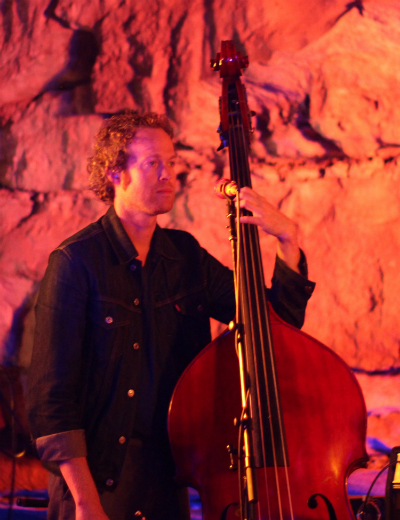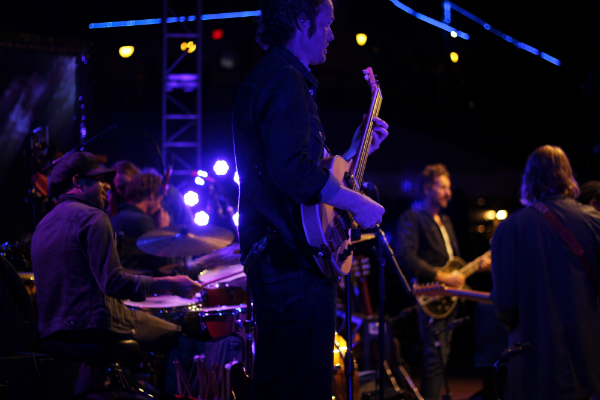In November 2016, Edward Sharpe and the Magnetic Zeros bassist Seth Ford-Young released the follow-up to his debut solo jazz album in hopes of “lighting a candle in the darkness” that surrounded him. The album was more than four years in the making, but one inspired by beauty, nostalgia and hope.
Shortly after ESMZ’s 2016 tour in Mexico City, Janglin Souls editor David Wexler caught up with Ford-Young to discuss the new album and life on the road with Edward Sharpe, among other things.
David Wexler: Can you discuss the process of writing and recording your new album, “Time Memory Beauty Hope?”
Seth Ford-Young: It all started on this little piano that Stewart (Cole) lent me, kind of indefinitely because I still have it. I moved into this new house and was like, “Man, I kinda want a small piano because a giant piano in here would be too much.” He was like, “I have this piano you can borrow.” So I just sat at that thing and I didn’t know if those compositions were going to be for the band (Edward Sharpe and the Magnetic Zeros) or for voice or for instruments or anything. I had no real intentions. I just wanted to sit down on a piano and write music.
It was just four of us in a room, no headphones, playing. It’s a very personal sound – which is why I kind of call it chamber music – because within that group, even though it’s only four instruments, that kind of quiet acoustic setting allows for the different characters and the different textures and sounds of those instruments. There’s a lot of orchestra in that four-person band. There’s a lot of different sounds. It can probably sound like more than four people at times. It’s just us getting different textures and qualities out of the instruments we have.
DW: Where did the title, “Time Memory Beauty Hope,” derive from?
SFY: I felt like writing music that is intended to be pretty, which is almost like a revolutionary act these days somehow because it’s sort of not that hip to write some simple, pretty melody or words that have something expressive in that way. So I felt like I was kind of lighting a candle in the darkness a little bit – especially as the years of working on this went on – and things like the election and other stuff going on all over the world. I felt like there was a lot of darkness. I felt like I wanted to evoke some different things in the music. And basically the title of the album is a list of things that I wanted the music to evoke and feelings I wanted to express to people.
Some of it is very happy, some of it is even kinda sad. “Time” or “Memory” can be sort of melancholy, but also in that melancholy there is also nostalgia, there’s a good memory. So it might have some darkness mixed in, but hopefully in a way that’s beautiful or nostalgic or hopeful.
DW: What do you think are the biggest differences between this album and your debut album?
 SFY: The first album, it took a while to figure out what I was trying to get to. The first album took a really long time to make. A lot of sessions and a lot of trial and error. I think I casted a wider net as far as style and what I was trying to express, and through the process of that, I got to where I am now, where I made this new album in a much more kind of focused way. Not just the process but also what I was trying to get across.
SFY: The first album, it took a while to figure out what I was trying to get to. The first album took a really long time to make. A lot of sessions and a lot of trial and error. I think I casted a wider net as far as style and what I was trying to express, and through the process of that, I got to where I am now, where I made this new album in a much more kind of focused way. Not just the process but also what I was trying to get across.
DW: On the first album, we got to hear you sing on a few tracks, such as “Skylark”; “If I Could Be With You;” and “A Cold Garden.” Any reason why you left your voice out of the new album?
SFY: That was a conscience decision, because I felt like as much as I like singing and I feel I have more to express as a singer, I wanted this to be more of a journey that you could just plug yourself into and kinda dealing with the same soundscape, the same instruments, the same palette but you’re getting all you need from that – not bringing in the voice for a song. By doing that, I feel there’s sort of a dreamy feeling and immersive quality in it, and you don’t get dragged out. I feel like that’s the main difference. It’s much more even of an experience where you hopefully listen to the whole album from start to finish and you don’t get ripped out of the dream. That feels like the biggest difference to me. Also, it’s almost all original material; the first one was only about half original. This one is about 70 to 80 percent original.
DW: Do you have any personal favorite songs from the new album?
SFY: The very first song, “If They Ask Me.” It’s sort of an odd choice for a first song. It almost feels like it should be the last song on the album, sort of a lullaby. But that particular piece, as far as the emotional content of it, is the strongest for me. When I listen to it, I still get kinda teary. The way the guys interpreted it really hit home, so that’s why I put that as the first song – even though it’s kind of a sleepy start to an album. I felt it had the most emotional impact so in that way, not sleepy.
DW: The members of ESMZ have collaborated on a lot of outside projects. How much of an influence did they have on “Time Memory Beauty Hope”?
SFY: In some ways, I would’ve liked to involve those guys just for the fact that they’re so important in my life and musically I’ve been so influenced by them … there’s no way they’re not in this album. But it was also something that I was doing off time. We do plenty of off-time stuff together, but it was kind of fun to do something totally separate and very different music. But they’re in there – there’s definitely an Edward Sharpe influence. The very last song on the album, “With Your Heart” … we were doing the sessions for “PersonA” and I went home to our little house in New Orleans that was down the street from the recording studio, and I sat down on the guitar and wrote that song. So I can’t help but think that it was influenced by whatever happened in the studio that day. So yeah, they’re in there, but they didn’t actually play or write any of it.
DW: 2016 was a big year for ESMZ, with the release of the band’s fourth studio album, “PersonA.” Many of your bandmates have said it is personally their favorite album and most meaningful? Describe what the album means to you?
SFY: Same feeling. Just because of the way we made this album. It was much more of a group effort than previously, so I think it felt more personal to each of us. But also, we’ve just been playing together for a lot longer and we’ve all gotten better hopefully as musicians. But some of the material that we came up with together feels so organic and meaningful – songs like “Wake Up The Sun” and “Let it Down.” I don’t think that one person would sit down and write those songs. I feel like it really sounds like a group of people got together and tried to make something meaningful and beautiful together, and obviously Alex (Ebert) wrote these great lyrics and melodies for everything. It’s definitely a special thing. And honestly, that album and making it was very inspirational to me finishing my album. I feel like I wanted to capture some of that – some of what we had in that album – to what I was doing. I just felt inspired in general.
DW: The new album features re-arrangements from Chopin and Erik Satie. Talk about the influence they have had on you?
SFY: Part of the concept of the first album that I kept for the second album was taking classical solo piano pieces and arranging them for quartet. So I continued that with another Erik Satie piece and two more Chopin pieces on the new album… I never took piano lessons as a kid and I’m never going to be a concert pianist and I’m never going to be able to play those Chopin pieces the way that they should be played on piano – unless I became a monk and just played piano for the rest of my life. But this is my way of being involved in that music, and hopefully find a new way to express it.
DW: What make making music – and especially playing live – so exciting and rewarding for you?
SFY: In some ways, it’s musicians doing what they do – like breathing. We’re gonna play and hopefully play in front of people. So when you’re breathing and people react the way that they do, especially in the Edward Sharpe environment that we create … Alex is a genius at creating that connection between the audience and the band. When you get that kind of reaction, there are really no words for it. You kinda just have to be there, right? It makes me feel connected. This world that we’re living in, we’re supposedly more connected than ever … but on a real energetic level, I feel like a lot of people are feeling lonely and their social lives are sort of fictitious in a way. As a culture, especially in America, we have tons of cultures but we don’t have one sort of thing we rally behind. So when you have something like music, which is really universal, it’s a place where we can all really come together and people don’t feel so separate. That feeling for me – the feeling I get playing music – whether it’s in a living room with just one other musician or being on stage in front of 30,000 people – the feeling is sort of the same. It’s a feeling of connection. At its roots, it’s the same. Of course, with 30,000 people, it’s amplified and it’s bigger but the actual mood and feeling is almost the same feeling – it’s just connecting.
Editor’s Note: You can purchase “Time Memory Beauty Hope” from Bandcamp, CD Baby, iTunes and Amazon.com. The album features Ford-Young, accordion master Rob Reich, rhymthm guitarist Jason Vanderford and violinist Evan Price.


